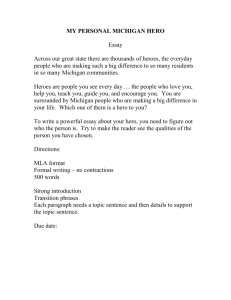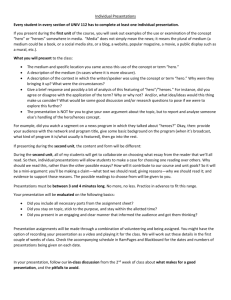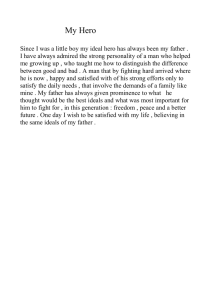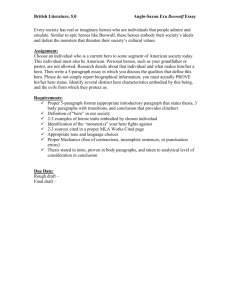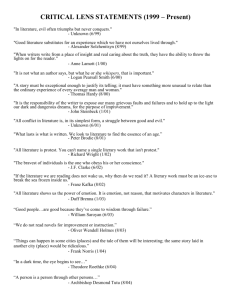Hero Wanted, No Cape Needed David A. Landry Course: English
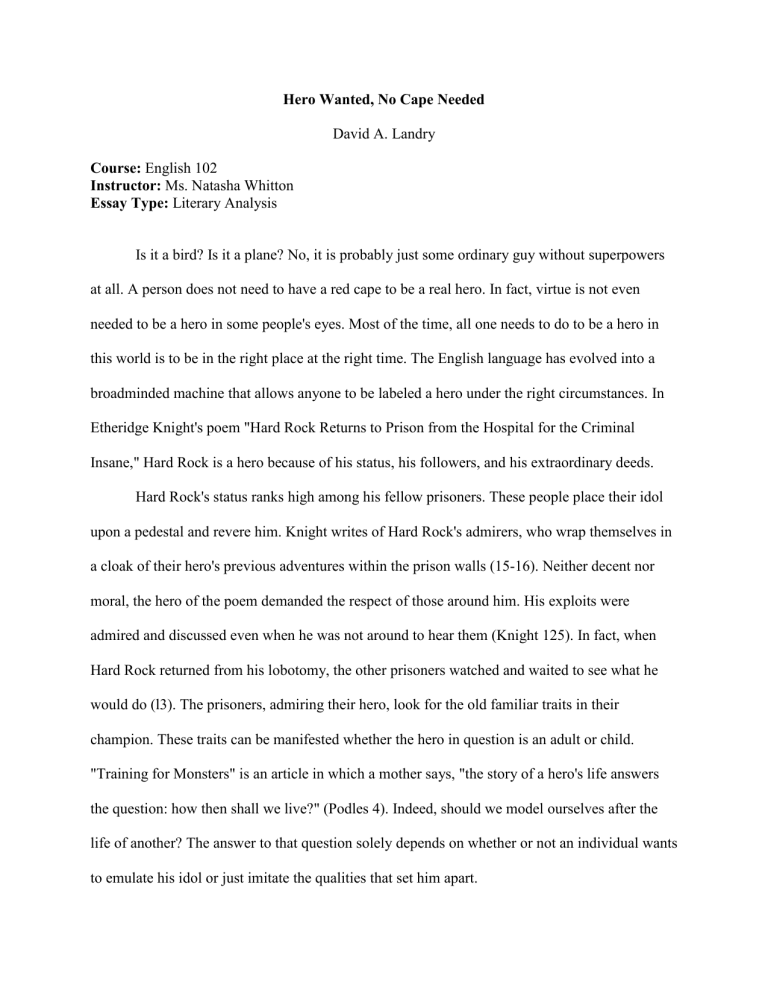
Course: English 102
Instructor: Ms. Natasha Whitton
Essay Type: Literary Analysis
Hero Wanted, No Cape Needed
David A. Landry
Is it a bird? Is it a plane? No, it is probably just some ordinary guy without superpowers at all. A person does not need to have a red cape to be a real hero. In fact, virtue is not even needed to be a hero in some people's eyes. Most of the time, all one needs to do to be a hero in this world is to be in the right place at the right time. The English language has evolved into a broadminded machine that allows anyone to be labeled a hero under the right circumstances. In
Etheridge Knight's poem "Hard Rock Returns to Prison from the Hospital for the Criminal
Insane," Hard Rock is a hero because of his status, his followers, and his extraordinary deeds.
Hard Rock's status ranks high among his fellow prisoners. These people place their idol upon a pedestal and revere him. Knight writes of Hard Rock's admirers, who wrap themselves in a cloak of their hero's previous adventures within the prison walls (15-16). Neither decent nor moral, the hero of the poem demanded the respect of those around him. His exploits were admired and discussed even when he was not around to hear them (Knight 125). In fact, when
Hard Rock returned from his lobotomy, the other prisoners watched and waited to see what he would do (l3). The prisoners, admiring their hero, look for the old familiar traits in their champion. These traits can be manifested whether the hero in question is an adult or child.
"Training for Monsters" is an article in which a mother says, "the story of a hero's life answers the question: how then shall we live?" (Podles 4). Indeed, should we model ourselves after the life of another? The answer to that question solely depends on whether or not an individual wants to emulate his idol or just imitate the qualities that set him apart.
Another factor of Hard Rock's life is the following that he acquired. His supremacy was known throughout the prison. Knight wrote, "Hard Rock was known not to take no [disrespect]"
(1). His unique power, his sheer terror, went before him and it was seen like an aura. Some people, outside of prison, have become quite infamous in their attempt to dominate the world and in the process have amassed a large amount of this terrible power. These leaders become heroes to many, many who would die for the leaders they worship. Odone writes, "Il Duce, like Adolf
Hitler, could hold an audience spellbound, inspire the troops […] and make ordinary people do extraordinarily evil things" (8). Because some rulers gain powerful reputations, people under them naturally follow them. The growth from their support elevates the hero to legendary proportions. Their hero becomes a god-man, one with almost superhuman attributes. This new idol has his reputation preceding him, and this reputation is as a bulletproof wall that keeps him from being touched. The seemingly omnipotent dictator is a hero to those fanatic followers.
Odone also wrote, "one person's hero […] could be another's villain" (8). This idea fits well into the opinionated buffet that we call society. People take what ideas they want from a person and leave the rest.
The most important thing that sets Hard Rock apart from the average prisoner was the ability to do some extraordinary things. He did not need magic powers, just the skill to do something that most other people could not do. "He had been our Destroyer," Knight writes, "our doer of things" (34). The imposing hero appeared to accomplish many things just because he was the only one doing anything. His accomplishments were overwhelmingly superior to his flock so they idolized him even more. In "Bats, Balls, and Idols," the author remembers his childhood admiration of two brothers that possessed an ability to fend off fear (Epstein 25). The Green brothers did not need to wear flashy costumes or flowing capes. All they needed was their
determination and their slightly imposing size to level their opponents on the football field. The
Greens simply got the job done. The Greens may have defined heroism as facing their adversary, whether another person or a tall building, and convincing themselves that the adversary can be overcome. Hard Rock did not just look at obstacles; he tackled them. A hero gets things done because he realizes that someone has to do it. It is the same with mountain climbers; when asked why he would climb the mountain, a true mountaineer would answer, "Because it was there."
One person may look at Hard Rock and deny him the title of hero because he is not an ethically good person. I disagree with them because people view heroism in different ways. One of Webster's definitions of a hero is "an object of extreme admiration and devotion" ("Hero," def.
4). The saying, one man's treasure is another man's trash, is certainly apropos in this case. It is evident that people admire their heroes in spite of what beliefs the hero may possess. Our country fell victim to an evil plot as the World Trade Center Towers fell in New York City on
September 11, 2001. The terrorist's leaders called the hijackers heroes, yet we do not pin medals on the breast of their surviving relatives. Another example is the Philistine's Goliath. Can we safely say that both David and Goliath were heroes on that battlefield thousands of years ago?
The Philistines regarded the giant Goliath as their champion while the opposing Israelites were hardly backing an undersized David. Opinions changed when one of the two men fell. The
Israelites had a new hero and the Philistines ran for cover. What happened to their hero, Goliath?
Apparently, Webster should change its definition to "an object of extreme admiration and devotion when said object is still unbeaten!" The moral of this lesson is akin to another saying: beauty is in the eye of the beholder. In the case of David and Goliath, the beautiful one was probably the one who had not lost his head.
People are called heroes because of their status, followers, or because they did something extraordinary. To be completely fair, it does not matter whether a person is a saint or a sinner.
All a person has to do to become a hero is get "caught" doing something that no one else had the knowledge, guts, or gumption to do. Society has a politically correct way to do and say anything.
However, society cannot strip the title of hero from a person based of that person's characterization. Let those who gave the hero his title have their Superman. What really counts is the fact that they have been given hope to succeed by someone. No red cape is required.
Works Cited
Epstein, Joseph "Bats, Balls, and Idols." American Enterprise September 2000: 25-27.
"Hero." Def. 4. Webster's Ninth New Collegiate Dictionary . 9th ed. 1991.
Knight, Etheridge. "Hard Rock Returns to Prison from the Hospital for the Criminal Insane."
Reading Literature and Writing Argument . Eds. Missy James and Alan P. Merickel.
Upper Saddle River: Prentice Hall, 2002. 125.
Odone, Christina. "We seem to have forgotten that heroes have usually led people to disaster."
New Statesman 2 June 2003: 8.
Podles, Mary Elizabeth "Training For Monsters." American Enterprise September 2000: 4-5.
David Landry is an Elementary Education major.
Ms. Whitton's Comments: In his essay, "Hero Wanted, No Cape Needed," David Landry was asked to define the term "hero" and to apply that definition to a particular character of his choice from a selection of course readings. As with many of the papers David turned in throughout his semester in English 102, he opted for a challenge when he examined Etheridge
Knight's "Hard Rock." The result demonstrates his creativity and his sharp critical thinking skills. The essay provides not only a definition, but also a literary analysis of the poem .


